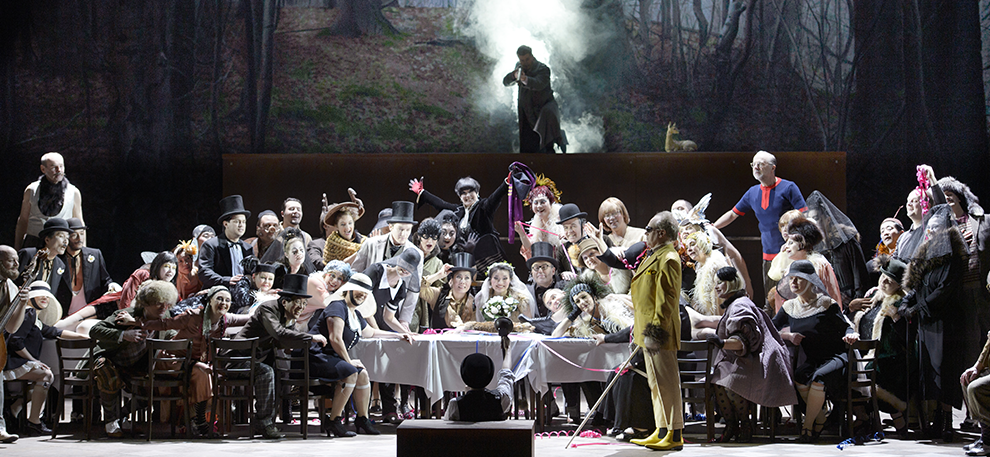Ensemble Members
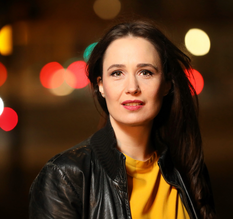
Ida Aldrian
mezzo-soprano
Ida Aldrian
Birthplace:
Bruck an der Mur, Austria
Studies:
University of Music and Performing Arts Vienna with Leopold Spitzer and Karlheinz Hanser; studies for Stage Performance (Opera and Musical Drama), Art Song and Oratorio with KS Marjana Lipovšek with honors; member of International Opera Studio of the Hamburg State Opera (2012/13–2013/14)
Master class:
With Ann Murray, Bernarda Fink, Reri Grist, Peter Kooij, Andrew Watts, Thomas Hampson, Wicus Slabbert, Alan Titus, Brigitte Fassbaender, et al.
Prizes:
Dr.-Wilhelm-Oberdörffer-Preis of Stiftung zur Förderung der Hamburgischen Staatsoper (2014), prize winner of the jury ranking at international singing competition „Stella Maris“ (2014)
Relation to the State Opera:
Ensemble member of the Hamburg State Opera since the season 2019/20
Important parts:
Wellgunde (Das Rheingold and Götterdämmerung), Siegrune and Rossweiße (Die Walküre), Blumenmädchen and Stimme aus der Höhe (Parsifal ), 2. Maid (Daphne), Feodor (Boris Godunov), Maddalena (Rigoletto), Hansel (Hansel and Gretel), Isabella (L'Italiana in Algeri), Adalgisa (Norma), Idamante (Idomeneo), Third Lady (The Magic Flute), Rosina (Il Barbiere di Siviglia), Penelope (Il Ritorno d'Ulisse in Patria), Mercedes (Carmen), Tisbe (La Cenerentola), Laura (Luisa Miller), Flora and Annina (La Traviata), Cherubino (Le Nozze di Figaro), Dorabella (Così fan tutte), Meg Page (Falstaff), Dryade (Ariadne auf Naxos), Orlofski (Die Fledermaus), et al.
Stages:
Elbphilharmonie, Concertgebouw Amsterdam, Kölner Philharmonie, Wiener Konzerthaus, Musikverein Wien, Staatstheater Nürnberg, Grafenegg Festival, Laeiszhalle Hamburg, Barocktage Melk, Styriarte, International Brucknerfest Linz, Staatsoper Unter den Linden, et al.
Cooperation with directors:
Andreas Homoki, Georg Schmiedleitner, Laura Scozzi, Mariame Clément, Verena Stoiber, Peter Konwitschny, Stéphane Braunschweig, David Bösch, et al.
Cooperation with conductors:
Simone Young, Kent Nagano, Martin Haselböck, Marcus Bosch, Yutaka Sado, Pablo Heras-Casado, Christopher Moulds, Cornelius Meister, Fabio Luisi, Andrés Orozco-Estrada, Simon Gaudenz, et al.
Performances

Kady Evanyshyn
Mezzo-Soprano
Kady Evanyshyn
Birthplace:
Winnipeg, Canada
Studies:
Bachelor and Master of Music, The Juilliard School
Awards/Competitions:
First Prize of the New Orleans District and Second Prize of the Gulf Coast Region at the Metropolitan Opera Laffont Competition (2023), Award from the Gerda Lissner Lieder/Song Competition (2017/18), Winner of the John Erskine Prize at The Juilliard School (2017) and the Tudor Bowl at the Winnipeg Music Festival (2015)
Masterclasses:
Lioba Braun, Brigitte Fassbänder, Elena Garanča, Thomas Hampson, Malcom Martineau, Anne Sofie von Otter, Bo Skovhus, Emmanuel Villaume, and others
Relation to the Hamburg State Opera:
Ensemble member of the Hamburg State Opera since the 2022/2023 season
Was member of the International Opera Studio of the Hamburg State Opera from 2019/20 to 2022/23
Important parts:
Annio (La clemenza di Tito), Cherubino (Le nozze di Figaro), Charlotte (Werther), Hänsel (Hänsel und Gretel), Siébel (Faust), Zweite Dame (Die Zauberflöte), Mercédès (Carmen), Meg Page (Falstaff), Tisbé (La Cenerentola), Second Woman (Dido and Aeneas), Fjodor (Boris Godunov), Frau Reich (Die Lustigen Weiber von Windsor), Phèdre (Hippolyte et Aricie), and others
Stages:
Opernhaus Zürich, Bregenzer Festspiele, Carnegie Hall, Opéra Royal de Versailles, Opera Holland Park, Verbier Festival, Aspen Music Festival
Song:
World Premiere of “Drei Grabschriften” (Stefano Gervasoni), Performances of “Animus II” (Druckman), “Folk Songs” (Berio) and “Liebeslieder Walzer” (Brahms), Competitor of the 2019 Wigmore Hall/Independent Opera Song Competition
Cooperation with Directors:
Edward Berkeley, Frank Castorf, Georges Delnon, James Darrah, Axel Ransich, Dmitri Tcherniakov, Jana Vetten, Stephen Wadsworth
Cooperation with Conductors:
Nicolas André, Paolo Arrivabeni, Giampaolo Bisanti, Daniele Callegari, William Christie, Jane Glover, Alexander Joel, Francesco Lanzillotta, Claire Levacher, Jeffrey Milarsky, Evelino Pidò, Teddy Poll, Avi Stein, Stephen Stubbs
Performances
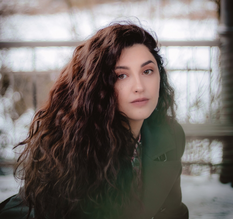
Elbenita Kajtazi
Soprano
Elbenita Kajtazi
Birthplace:
Mitrovica, Kosovo
Studies:
Graduated summa cum laude from the Mitrovica Conservatory of Music (2009), subsequently studied at the University of Prishtina
Prizes:
Audience Prize and 3rd place at the first Glyndebourne Opera Cup (2018), first prize and special prize at the Riccardo Zandonai Competition (2015), first prize at the Spiros Argiris Competition of the Sarzana Opera Festival in Italy (2014), scholarship holder of the Förderkreis der Deutschen Oper Berlin (2014-2016), participant of the Young Singers Project at the Salzburg Festival (2016), Dr. Wilhelm Oberdörffer Prize Hamburg (2020).
Relation to the Hamburg State Opera:
Ensemble member of the Hamburg State Opera since the 2018/19 season
Important parts:
Violetta (La Traviata), Nannetta (Falstaff), Mimi (La Boheme), Manon (Manon), Micaëla (Carmen), Liù (Turandot), Pamina (Die Zauberflöte), Susanna (Le Nozze di Figaro), Contessa (Le Nozze di Figaro), Gretel (Hänsel und Gretel), Musetta (La Bohème), Adina (L'elisir d'amore), Marzelline (Fidelio), et al.
Stages:
Staatsoper Hamburg, Deutsche Oper Berlin, Staatsoper Unter den Linden, Bayrische Staatsoper, Opernhaus Zürich, Semperoper Dresden, Grand Théâtre de Genève, Opéra National de Bordeaux, Teatro Municipal de Santiago, Aalto-Teater Essen, Philharmonie Essen, et al.
Cooperation with conductors:
Tomáš Netopil, Friedrich Haider, Riccardo Minasi, Roberto Rizzi Brignoli, Axel Kober, Patrick Fournillier, Donald Runnicles, Yoel Gamzou, Kent Nagano, Nicholas Carter, et al.
Performances
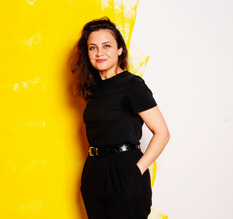
Katharina Konradi
Soprano
Katharina Konradi
Birthplace:
Bischkek, Kyrgyzstan
Studies:
Singing education with Julie Kaufmann in Berlin, master's degree in song composition with Christiane Iven and Donald Sulzen at Hochschule für Musik und Theater München
Master class:
with Helmut Deutsch and Klesie Kelly-Moog
Prizes:
BBC New Generation Artist (2018–20), prize of Deutscher Musikwettbewerb in Bonn (2016), special prize of Walter und Charlotte Hamel Stiftung, prizewinner of Bundeswettbewerbs „Jugend musiziert“ and of Sommerakademie Mozarteum (2015), 1st prize of Kulturkreis Gasteig München in the classification „Lied-Duo“ (2015); scholarship holder of Paul-Hindemith-Gesellschaft Berlin, of Yehudi Menuhin Stiftung „Live Music Now“ and of Studienstiftung des deutschen Volkes
Relation to the Hamburg State Opera:
Ensemble member of the Hamburg State Opera since 2018/19 season
Important parts:
Pamina (Die Zauberflöte), Gretel (Hänsel und Gretel), Adele (Die Fledermaus), Susanna (Le nozze di Figaro), Zerlina (Don Giovanni), Zdenka (Arabella), Ännchen (Der Freischütz), Anne Frank (Das Tagebuch der Anne Frank), et al.
Stages:
Hessisches Staatstheater Wiesbaden, Elbphilharmonie, Kammeroper München, Theater Hof, Mainfranken Theater Würzburg, et al.
Cooperation with conductors:
Lionel Bringuier, Paavo Järvi, Thomas Hengelbrock, Patrick Lange, Konrad Junghänel, et al.
Performances
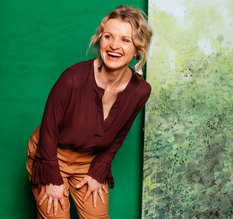
Jana Kurucová
Mezzosoprano
Jana Kurucová
Birthplace:
Kežmarok, Slovakia
Education / Studies:
Classical singing at the Konzervatórium J. L. Bellu in Banska Bystrica, in Bratislava as well as at the Musikhochschule in Graz, opera studio of the Bayerische Staatsoper (season 2005/2006), ensemble member of the Theater Heidelberg (2006 to 2009), ensemble member of the Deutsche Oper Berlin ( 2009 to 2018)
Relation to the Hamburg State Opera:
Ensemble member of the Hamburg State Opera since the 2019/20 season
Important parts:
Niklausse/Muse (Les contes d‘Hoffmann), Prinz Orlovsky (Die Fledermaus), Isolier (Le comte Ory), Dorabella (Così fan tutte), Marta (Faust), Carmen (Carmen), Elisabetta (Maria Stuarda), Romeo (I capuleti e i Montecchi), Donna Elvira (Don Giovanni), Suzuki (Madama Butterfly), Meg Page (Falstaff), Fuchs (Das schlaue Füchslein), Maffio Orsini (Lucrezia Borgia), Melisande (Pelléas et Mélisande), Zerlina (Don Giovanni), Mercedes (Carmen), Hänsel (Hänsel und Gretel), Fenena (Nabucco), Rosina (Il Barbiere di Siviglia), Idamante (Idomeneo), Sesto (La clemenza di tito), Cherubino (Le nozze di Figaro), Ramiro (La finta giardiniera), Zweite Dame (Die Zauberflöte), et al.
Stages:
Teatro de la Maestranza in Sevilla, Badisches Staatstheater Karlsruhe, Staatstheater Stuttgart, Nationaltheater Prag, Teatro Petruzzelli in Bari, Oper Peking, Deutsche Oper Berlin, Oper Oslo, Semperoper Dresden, Bayerische Staatsoper, Festspielhaus Baden-Baden, New National Theater Tokyo, Musikfestival Klangvokal in Dortmund, Banská Bystrica, Festival Svátky hudby v Praze, Filharmonie Reduta in Bratislava, Bratislava Nationaltheater, et al.
Cooperation with directors:
Laurent Pelly, David Alden, Robert Borgmann, Philipp Himmelmann, Katharina Thalbach, David Herrmann, Roland Schwab, Philipp Stölzl, Christof Loy, Kirsten Harms, Andreas Homoki, et al.
Cooperation with conductors:
Pedro Halffter, Enrique Mazzola, Michele Mariotti, Ido Arad, Donald Runnicles, Daniel Cohen, Stefan Soltesz, Fabio Luisi, Zubin, Mehta, Alessandro de Marchi, Jacques Lacombe, Omer Meir Wellber, Carlo Rizzi, Ivan Repusic, Moritz Gnann, Jonathan Darlington, Marco Letonja, Francesco Ivan Ciampa, Giacomo Sagripanti, Constantin Trinks, Yves Abel, Ottavio Dantone, Matteo Beltrami, Jonathan Nott, et al.
Performances
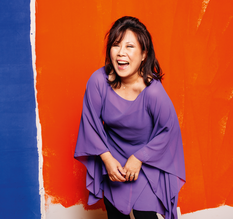
Hellen Kwon
Soprano
Hellen Kwon
Birthplace:
Seoul, South Korea
Studies:
Hochschule für Musik Köln with Dietger Jacob (1979-1984)
Prizes:
First prize in the Novara International Singing Competition (1984), winner of the Dr. Wilhelm Oberdörffer Preis (1987), Rolf-Mares-Preis in the category “Exceptional Performances of an Actresses” for her interpretation of “Frau” in Wolfgang Rihm’s “Das Gehege” (2010), Grammy Award Nomination for the recording of Walter von Braunfels’ “Die Vögel” conducted by Lothar Zagrosek, honored with the title of “Hamburger Kammersängerin” by the Hamburg Senate (2011), “Order of Civil” by the Korean Government for exceptional artistic achievements (2013), “Star of Ewha” Prize (2018)
Relation to the Hamburg State Opera:
Ensemble member of the Hamburg State Opera since 1987/88
Important parts:
The Queen of the Night (Die Zauberflöte), Zerbinetta (Ariadne auf Naxos), Sophie (Der Rosenkavalier), Zdenka (Arabella), Susanna (Le Nozze di Figaro), Blonde/Konstanze (Die Entführung aus dem Serail), Fiordiligi (Così fan tutte), Donna Anna/Donna Elvira (Don Giovanni), Despina/Fiordiligi (Così fan tutte), Elettra (Idomeneo), Vitellia (La clemenza di Tito), Musetta/Mimì (La Bohème), Cio-Cio-San (Madama Butterfly), Liú (Turandot), Violetta Valéry (La Traviata), Gilda (Rigoletto), Oscar (Un Ballo in Maschera), Rosina (Il Barbiere di Siviglia), Micaëla (Carmen), Norina (Don Pasquale), Adina (L’Elisir d’Amore), Adele/Rosalinde (Die Fledermaus), Agathe (Der Freischütz), Senta (Der fliegende Holländer), Minni (La Fanciulla del West), Frau (Das Gehege), Salome/Herodias (Salome), Chrysothemis (Elektra), et al.
Stages:
Hamburgische Staatsoper, Bayerische Staatsoper, Bayreuther Festspiele, Staatsoper Unter den Linden Berlin, Semperoper Dresden, Gewandhaus Leipzig, Oper Leipzig, Oper Stuttgart, Oper Köln, Deutsche Oper am Rhein, Staatstheater Wiesbaden, Wiener Staatsoper, Wiener Festwochen, Salzburger Festspiele, Opernhaus Zürich, Grand Théâtre de Genève, Concertgebouw Amsterdam, Festival d‘Aix-en-Provence, Opéra Comique de Paris, Glyndebourne Festival, Den Norske Opera, Accademia Nazionale di Santa Cecilia, Teatro Filarmonico Verona, The Israeli Opera, Jerusalem Opera Festival, New National Theatere Tokio, Korean National Opera, et al.
Cooperation with directors:
Achim Freyer, Peter Konwitschny, Johannes Schaaf, Günther Krämer, Marco Marelli, Jean-Pierre Ponnelle, Peter Sellars, John Dew, Adolf Dresen, Nikolas Brieger, Johannes Erath, Claus Guth, et al.
Cooperation with conductors:
Giuseppe Sinopoli, Vladimir Ashkenazy, Horst Stein, Neville Marriner, Zubin Mehta, James Levine, Jeffrey Tate, Marcello Viotti, Simone Young, Nikolaus Harnoncourt, Wolfgang Sawallisch, Kent Nagano, Christian Thielemann, et al.
Performances
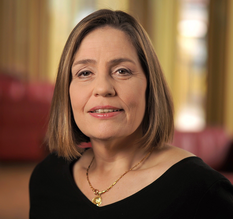
Katja Pieweck
Soprano
Katja Pieweck
Birthplace:
Hannover, Germany
Studies:
Hochschule für Musik und Theater in Hamburg with Prof. Ks. Judith Beckmann
Prizes:
Dr. Wilhelm Oberdörffer Preis of the Körber-Stiftung (2007), Cultural Prize of the Berenberg Bank Hamburg (2000), First Prize of the International Robert Stolz Singing Competition in Hamburg (2000), Masefield Fellowship of the Alfred Toepfer Stiftung
Relation to the Hamburg State Opera:
Ensemble member of the Hamburg State Opera since 1999/2000, member of the International Opera Studio of the Hamburg State Opera (1997/98 to 1998/99)
Important parts:
Adalgisa (Norma), Mercédès (Carmen), Hexe (Königskinder), Smeton (Anna Bolena), Alisa (Lucia di Lammermoor), Marquise de Berkenfield (La fille du régiment), Sélysette (Ariane et Barbe-Bleue), Arsamene (Xerxes), Sancta Susanna (Klementia), Gertrud/Sandmännchen (Hänsel und Gretel), Frau des Dorfrichters (Jenufa), Valencienne (Die lustige Witwe), Witwe Browe (Zar und Zimmermann), Lola (Cavalleria Rusticana), Damigella Pallade (L’Incoronazione di Poppea), Dorabella (Così fan tutte), Marcellina (Le Nozze di Figaro), Erste Dame (Die Zauberflöte), Donna Elvira (Don Giovanni), Schenkwirtin (Boris Godunov), Mutter (Les Contes d’Hoffmann), Mère Marie (Dialogues des Carmélites), Ciesca (Gianni Schicchi), Suzuki (Madama Butterfly), Frugola (Il Tabarro), Goneril (Lear), Berta/Rosina (Il Barbiere di Siviglia), Marchese Melibea (Il Viaggio a Reims), Ariadne (Ariadne), Adelaide (Arabella), Annina (Der Rosenkavalier), Aufseherin/1. Magd (Elektra), Curra/Preziosilla (La Forza del Destino), Annina (La Traviata), Meg Page/Alice Ford (Falstaff), Giovanna/Maddalena (Rigoletto), Fenena (Nabucco), Emilia (Otello), Fricka (Das Rheingold), Siegrune/Sieglinde (Die Walküre), Magdalena (Die Meistersinger von Nürnberg), Brangäne (Tristan und Isolde), Ortrud (Lohengrin), Adriano (Rienzi), Eglantine (Euryanthe), Ericlea (Il Ritorno d’Ulisse in Patria), Larina (Eugen Onegin), et al.
Stages:
Hamburgische Staatsoper, Semperoper, Staatsoper Unter den Linden, Staatstheater Mainz, Bayerische Staatsoper, Oper Leipzig, Internationale Herrenchiemsee Festspiele, Staatsoper Hannover, et al.
Zusammenarbeit mit Regisseuren:
Peter Konwitschny, Karoline Gruber, Claus Guth, Willy Decker, Achim Freyer, Roger Vontobel, Stefan Herheim, Michael Thalheimer, et al.
Zusammenarbeit mit Dirigenten:
Simone Young, Sir Simon Rattle, Peter Schneider, Ingo Metzmacher, Gerd Albrecht, Sebastian Weigle, Rolf Beck, Krzysztof Penderecki, et al.
Performances

Narea Son
Soprano
Narea Son
Birthplace:
Seoul, South Korea
Studies:
Bachelor's degree at Seoul National University, master's degree opera and concert exam opera at Hochschule für Musik und Theater in Hamburg
Master class:
with Edita Gruberová, Jaume Aragall, Cheryl Studer, Mariella Devia, Thomas Quastoff, Edda Moser, Brigitte Fassbaender und Joyce DiDonato at Carnegie Hall in New York with Live Stream by Arte TV, et al.
Relation to the Hamburg State Opera:
Ensemble member of the Hamburg State Opera since the 2019/20 season
Was a member of the International Opera Studio of the Hamburg State Opera 2016/17 and 2017/18
Important parts:
Luisa (Luisa Miller), Donna Anna (Don Giovanni), Micaëla (Carmen), Norina (Don Pasquale), Susanna (Le nozze di Figaro), Adele (Die Fledermaus), Pamina (Erzittre, feiger Bösewicht!, Neufassung der Zauberflöte von J. Harneit), Marzelline (Fidelio), Zerlina (Don Giovanni), Katze Ivanka (U.A. Katze Ivanka), Blonde (Die Entführung aus dem Serail), et al.
Stages:
Staatsoper Hamburg, Elbphilharmonie, Theater Bremen, Sejong Center (Seoul Metropolitan Opera), Shanghai Grand Theater, Geumho Concert Hall, et al.
Cooperation with directors:
Achim Freyer, Philipp Stölzl, Georges Delnon, Vera Nemirova, David Bösch, BARBE&DOUCET et al.
Cooperation with conductors:
Kent Nagano, Alexander Joel, Johannes Fritzsch, Massimo Zanetti, Christopher Moulds, Renato Palumbo, Axel Kober, Jonathan Darlington, et al.
Performances
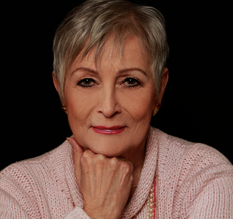
Renate Spingler
Mezzo-soprano
Renate Spingler
Birthplace:
Kempten, Germany
Studies:
Staatliche Hochschule für Musik in Munich
Master class:
with Prof. Reri Grist
Prizes:
Honored by the Hamburg Senate with the title of “Hamburger Kammersängerin” (2017)
Relation to the Hamburg State Opera:
Ensemble member of the Hamburg State Opera since 1986/87
Important parts:
Octavian (Der Rosenkavalier), Margret (Wozzeck), Sdena (Das Fest im Meer), Gräfin Helfenstein/Üppigkeit (Mathis der Maler), Sigrune/Rossweiße/Wellgunde (Der Ring des Nibelungen), Donna Elvira (Don Giovanni), Dorabella (Così fan tutte), Suzuki (Madama Butterfly), Herodias (Salome), Adelaide (Arabella), Flora (La Traviata), Larina (Eugen Onegin), Cherubino (Le Nozze di Figaro), Prinz Orlofsky (Die Fledermaus), Lœna (La belle Hélène), Brigitta (Die tote Stadt), Mary (Der fliegende Holländer), Geneviève (Pelléas et Mélisande), Mère Jeanne de l’Enfant-Jésus (Dialogues des Carmélites), Circe (I.th.Ak.A.), Gräfin Geschwitz (Lulu), Mercédès (Carmen), Hippolyta (A Midsummer Night’s Dream), Marthe Schwerdtlein (Faust), Lola/Mama Lucia (Cavalleria Rusticana), Ottavia (L’Incoronazione di Poppea), 2. Dame (Die Zauberflöte), Tisbe (La Cenerentola), Maddalena (Rigoletto), Tebaldo (Don Carlos), Emilia (Otello), Gaea (Daphne), Hänsel/Hexe (Hänsel und Gretel), Miss Baggott (Der kleine Schornsteinfeger), Auntie (Peter Grimes), Die böse Königin (Schneewittchen), et al.
Stages:
Hamburgische Staatsoper, Oper Frankfurt, Semperoper Dresden, Theater Bonn, Oper Leipzig, Theater Bremen, La Monnaie, Oper Köln, Königliche Oper Kopenhagen, Prinzregententheater München, Theater an der Wien, Theatro Municipale de Sao Paulo, Gran Teatre del Liceu, et al.
Cooperation with directors:
Ruth Berghaus, Willy Decker, Gian-Carlo di Monaco, Dieter Dorn, Adolf Dresen, August Everding, Jürgen Flimm, Achim Freyer, Ramin Gray, Caroline Gruber, Claus Guth, Hans Hollmann, Andreas Homoki, Günter Krämer, Harry Kupfer, Nikolaus Lehnhoff, Juri Ljubimov, Marco Aturo Marelli, Christian Pade, Simon Philips, Ernst-Theo Richter, Nils-Peter Rudolf, Johannes Schaaf, Sir Peter Ustinov, Christoph von Bernuth, Robert Wilson, et al.
Cooperation with conductors:
Gerd Albrecht, Marc Albrecht, Marco Armiliato, Gary Bertini, Michael Boder, Nathan Brock, Semyon Bychkov, Giuliano Carella, Bertrand de Billy, Jaqcues Delaôte, Alessandro di Marci, Peter Eötvös, Alfred Eschwé, Lawrence Foster, Michael Halasz, Eliahu Inbal, René Jacobs, Günter Jena, Alexander Joel, Karen Kamensek, Paul Kildea, Bernhard Klee, Jun Märkl, Cornelius Meister, Ingo Metzmacher, Kent Nagano, Garcia Navarro, Giuseppe Patané, Christoph Prick, Wolfgang Rennert, Donald Runnicles, Michael Schønwandt, Peter Schreier, Klauspeter Seibel, Giuseppe Sinopoli, Leonard Slatkin, Alexander Soddy, Stefan Soltesz, Marcello Viotti, Sebastian Weigle, Bruno Weil, Simone Young, Lothar Zagrosek, Hans Zender, et al.
Performances
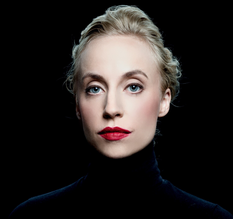
Kristina Stanek
Mezzo-soprano
Kristina Stanek
Birthplace:
Krefeld, Germany
Studies:
Master studies with distinction at the Royal Academy of Music, London
Prizes:
Best young singer at the European Music Festival in Rome, Italy; 1st prize at the Mozart Competition in Prague, Czech Republic; 1st prize at the Rotary Music Competition, Germany
Relation to the Hamburg State Opera:
Ensemble member of the Hamburg State Opera since season 2020/21
Important parts:
Brangäne (Tristan und Isolde), Prinzessin Eboli (Don Carlos), Azucena (Il trovatore), Carmen (Carmen), Romeo (I Capuleti e i Montecchi), Suzuki (Madama Butterfly), 2. Norn (Götterdämmerung), Maddalena (Rigoletto), et al.
Stages:
Staatsoper Hamburg, Staatsoper Unter den Linden, Semperoper Dresden, Staatsoper Stuttgart, Grand Théâtre de Genève, Badisches Staatstheater Karlsruhe, Theater Basel, et al.
Cooperation with directors:
Hans Neuenfels, Dmitri Tcherniakov, Michael Thalheimer, Lydia Steier, Yuval Sharon, David Bösch, Sebastian Baumgarten, Barbara Frey, et al.
Cooperation with conductors:
Kent Nagano, Christian Thielemann, Marco Armiliato, Philipp Jordan, Antonello Manacorda, Marek Janowski, Ivor Bolton, Marc Albrecht, Giampaolo Bisanti, Axel Kober, Jonathan Darlington, Erik Nielsen, Kristiina Poska, Joana Mallwitz, Titus Engel, Christopher Moulds, Gianluca Capuano, Jonathan Stockhammer, David Parry, Christian Curnyn, Michele Spotti, Thomas Guggeis, et al.
Performances
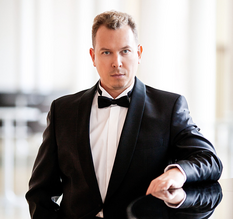
Alexey Bogdanchikov
Baritone
Alexey Bogdanchikov
Birthplace:
Tashkent, Uzbekistan
Studies:
Galina Vishnevskaya Opera Centre, Tchaikovsky State Conservatory in Moscow
Prizes:
Winner of the 57th International Singing Competition "Voci Verdiane" in Busseto (2019), Dr. Wilhelm Oberdörffer-Preis (2017), Special Prize at the “Neue Stimmen” competition (2013), representative for Russia at the BBC Cardiff Singer of the World Competition (2013), second prize at the European Vocal Competition “Debut” (2012), third prize at the Armel Opera Competition in Hungary (2010)
Relation to the Hamburg State Opera:
Ensemble member of the Hamburg State Opera since 2015/16
Important parts:
Barrett (The Servant), Wolfram (Tannhäuser), Eugen Onegin (Eugen Onegin), Robert (Iolanta), Prinz Jeletzki (Pique Dame), Belcore (L’Elisir d’Amore), Marcello (La Bohème), Moralès (Carmen), Graf (Le Nozze di Figaro), Mercutio (Roméo et Juliette), Rodrigo (Don Carlo), Frank und Fritz (Die tote Stadt), Silvio (Pagliacci), Sharpless (Madama Butterfly), Figaro (Il Barbiere di Siviglia), Valentin (Faust), Enrico (Lucia di Lammermoor), Carlo Gérard (Andrea Chénier von Umberto Giordano), Malatesta (Don Pasquale), et al.
Stages:
Armel Opernfestival in Szeged, Teatro Comunale di Bologna, Guangzhou Opera House, Teatro Comunale Luciano Pavarotti in Modena, Teatro Municipale in Piacenza, Teatro Delle Muse in Ancona, Teatro dell’Opera di Roma, Astrakhan Opera House, Magnitogorsk Opera House, Kolobov Novaya Opera Theatre Moscow, Deutsche Oper Berlin, Hamburgische Staatsoper, Staatsoper Hannover, Sankt Galler Festspiele, et al.
Cooperation with conductors:
Jader Bignamini, Francesco Ivan Ciampa, Emmanuel Villaume, Renato Palumbo, Erich Wächter, Alexander Joel, Stefano Ranzani, Josep Caballé Domenech, Nathan Brock, Gregor Bühl, Kent Nagano, Pier Giorgio Morandi, Christoph Gedschold, Carlo Rizzari, Christopher Ward, et al.
Performances
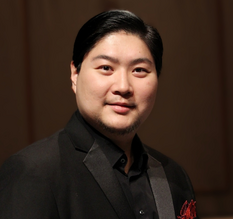
Chao Deng
Bass-baritone
Chao Deng
Birthplace:
Tianjin, China
Studies:
Vocal studies in Tianjin, China; diploma in voice at the Hochschule für Musik Würzburg with Cheryl Studer; master studies with Christian Elsner and in the Lied class of Gerold Huber and opera studio at the Hochschule für Musik Weimar with Prof. Dr. Michail Lanskoi; master class exam at the Hochschule für Musik Dresden with KS Prof. Matthias Henneberg.
Master classes:
With Liang Li, Michaelis Doukakis, John Norris, KS Camilla Nylund, KS Helen Donath, KS Brigitte Fassbaender, Sonja Prina, Alberto Triola, Catherine Foster, Georg Zeppenfeld, Juliane Banse, Roberto Scandiuzzi, KS Deborah Polaski.
Awards:
Prize for Opera Singing of the Concerto Foundation Würzburg (2015), Prize Winner of the International Singing Competition of the Chamber Opera Schloss Rheinsberg (2014), Scholarship Holder of the Richard Wagner Association Bayreuth Festival (2014), et al.
Relation to the State Opera:
Ensemble member of the Hamburg State Opera since the 2020/21 season.
Important roles:
Figaro (Le Nozze di Figaro), Escamillo (Carmen), Alidoro (La Cenerentola), Peter (Hänsel und Gretel), Fasolt (Das Rheingold), Comte Capulet (Roméo et Juliette), Häuptling Abendwind (Häuptling Abendwind), Ramfis (Aida), Gianni Schicchi/Betto di Signa (Gianni Schicchi), Papageno/Sprecher /2. Geharnischte (Die Zauberflöte), Frank (Die Fledermaus), Don Fernando (Fidelio), Schaunard (La Bohème), Herr Fluth (Die lustigen Weiber von Windsor), Kilian/Ottokar (Der Freischütz), Buonafede (Il mondo della luna), Förster (Das schlaue Füchslein), Le Duc (Romeo et Juliette), Angelotti (Tosca), Colas (Bastien et Bastienne), Priamus (Les Troyens), Antonio (Le nozze di Figaro), Marullo/Ceprano (Rigoletto), Zuniga (Carmen), De Retz (Les Huguenots), Lord Syndham (Zar und Zimmermann), Spielmann (Königskinder), Journalist (Lulu), Osias, Oberpriester (Judith), et al.
Stages:
Hamburg State Opera, Opernhaus Zürich, Bavarian State Opera, Dresden Semper Opera, German Opera on the Rhine, Dresden Philharmonic, Braunschweig State Theater, German National Theater Weimar, Dresden State Operetta, Erfurt Theater, Weimarhalle, Saar Music Festival, Shanghai Opera House, et al.
Collaboration with directors:
Peter Konwitschny, Lydia Steier, Barrie Kosky, Mariame Clément,Yona Kim, Manfred Weiß, Sabine Hartmannshenn, Hasko Weber, Anette Leistenschneider, Guy Montavon, Andrea Moses, et al.
Collaboration with conductors:
Kent Nagano, Sebastian Weigle, Stefano Ranzani, John Fiore, Stefan Soltész, Xu Zhong, Daniele Callegari, Speranza Scappucci, Giampaolo Bisanti, Ivan Repušić, Riccardo Minasi, Giacomo Sagripanti, Roberto Rizzi Brignoli, Thomas Leo Cadenbach, Moritz Gnann, Felix Krieger, Christoph Gedschold, Kristiina Poska, Tomáš Netopil, Antonino Fogliani, Omer Meir Wellber, Nikolaj Szeps-Znaider, Stefan Lano, Martin Hoff, Georg Fritzsch, et al.
Performances
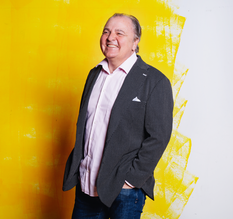
Peter Galliard
Tenor
Peter Galliard
Birthplace:
Chur, Switzerland
Studies:
With Rico Peterelli, Conservatory in Feldkirch with Maria Eibenschütz, at the Mozarteum Salzburg with Rudolf Knoll
Prizes:
First Prize at the International Mozart Competition (1985), Förderpreis of the Kanton Graubünden (1987), Dr. Wilhelm-Oberdörffer-Preis of the Stiftung zur Förderung der Hamburgischen Staatsoper (1989), honored by the Hamburg Senate with the title of “Kammersänger” (2017)
Relation to the Hamburg State Opera:
Ensemble member of the Hamburg State Opera since 1986/87
Important parts:
Tamino (Die Zauberflöte), Jaquino (Fidelio), Cassio (Otello), Froh and Loge (Das Rheingold), Alfred and Eisenstein (Die Fledermaus), Peter Iwanow (Zar und Zimmermann), Bardolfo (Falstaff), Hauptmann (Wozzeck), Knusperhexe (Hänsel und Gretel), Lenski (Eugen Onegin), Narraboth (Salome), Don Basilio (Le Nozze di Figaro), Prinz and Hauptmann (Lulu), L’Aumonier (Dialogues des Carmélites), Melot (Tristan und Isolde), Walther von der Vogelweide (Tannhäuser), Wolfgang Capito (Mathis der Maler), Goro (Madama Butterfly), Red Whiskers (Billy Budd), Dämon (L’Upupa und der Triumph der Sohnesliebe), Bischof von Budoja (Palestrina), Mime (Siegfried), et al.
Stages:
Hamburgische Staatsoper, Lucerne Festival, Salzburger Osterfestspiele, Opéra National de Paris, Enescu Festival in Bukarest, Staatsoper Unter den Linden Berlin, Deutsche Oper Berlin, Oper Frankfurt, Semperoper Dresden, Oper Leipzig, Staatstheater Nürnberg, et al.
Cooperation with directors:
Claus Guth, August Everding, Johannes Schaaf, Harry Kupfer, Peter Konwitschny, Johannes Erath, Renaud Doucet, Georg Schmiedleitner, Stefan Herheim, Herbert Wernicke, Calixto Bieito, Willy Decker, Paul-Georg Dittrich, et al.
Cooperation with conductors:
Nikolaus Harnoncourt, Christian Thielemann, Ingo Metzmacher, Simone Young, Kirill Petrenko, Kent Nagano, Lawrence Foster, Gerrit Prießnitz, Marcus Bosch, Philippe Jordan, Paolo Carignani, Vaclav Luks, et al.
Performances
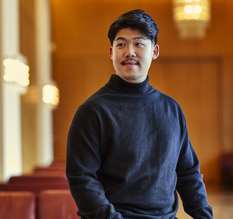
David Minseok Kang
Bass
David Minseok Kang
Origin:
Korea
Studies:
Kyunghee University in Seoul with Alfred Kim, Staatliche Hochschule für Musik und Darstellende Kunst Stuttgart Master class Oper with Ulrike Sonntag (2018-2022)
Master classes:
With Jenny Anvelt, Bo Skovhus, Kwangchul Youn, Margreet Honig, Gundula Schneider
Important parts:
Sarastro (Die Zauberflöte), Colline (La Bohème), Dr. Grenvil (La Traviata), Gremin (Eugen Onegin), Reinmar von Zweter (Tannhäuser), Don Alfonso (Così fan tutte), Sparafucile (Rigoletto), Colline (La Bohème), et al.
Stages:
Staatsoper Stuttgart, Ettlinger Schlossfestspiele, Theater Kiel, Oper Zürich
Relation to the State Opera:
Member of the International Opera Studio from 2019/2020 to 2021/2022
Ensemble member since 2022/2023
Cooperations with directors:
Blanka Radoczy, Solvejg Bauer, Bernd Schmitt
Cooperations with conductors:
Kent Nagano, Nicolas Andre, Matteo Beltrami, Paolo Arrivabeni, Giampaolo Bisanti, Francesco Ivan Ciampa
Performances
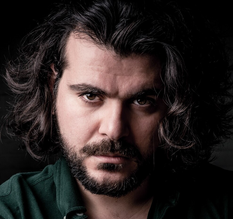
Kartal Karagedik
Baritone
Kartal Karagedik
Birthplace:
Izmir, Turkey
Studies:
Singing in Izmir at the University of Istanbul, among others with Alper Kazancioglu and Prof. Güzin Gürel
Master classes:
With Giorgio Zancanaro, Paolo Ballarin, Barbara Frittoli, Luciana Serra and Alfonso Antoniozzi.
Prizes:
First Prize at the Debut Competition (2012), Third Prize and Critics' Award at the Ottavio Ziino Concorso Lirico Internazionale in Rome (2011), Second Prize at the Leyla Gencer Competition in Istanbul (2010), Second Prize at the Beniamino Gigli Competition in Rome (2009), "Best Male Singer" at the International Duchi d'Acquaviva Competition in Atri (2008), "Special Mention Prize" at the International Opera Competition in Como (2008), third prize at the Ferruccio Tagliavini Competition in Graz (2007), first prize at the Güzin Gürel Foundation Lieder Competition in Istanbul (2007)
Relation to the Hamburg State Opera:
Ensemble member of the Hamburg State Opera since 2015/16
Important parts:
Renato (Un ballo in maschera), Rodrigo (Don Carlo), Germont (La Traviata), Simon Boccanegra (Simon Boccanegra), Onegin (Eugeny Onegin), Lescaut (Manon Lescaut), Marcello (La Bohème), Sharpless (Madama butterfly), Sonora (La Fanciulla del West), (Enrico (Lucia di Lammermoor), Duca D'alba (Duca D'alba), Belcore (L'Elisir d'Amore), Riccardo (I Puritani), Il Conte d'Almaviva (Le Nozze di Figaro), Guglielmo (Così fan tutte), Don Giovanni (Don Giovanni), Carlo Gérard (Andrea Chénier), Mischonnet (Adriana Lecouvreur), Dandini (La Cenerentola), Poeta ( Il Turco in Italia), Chorébe (Les Troyens), Escamillo (Carmen), Valentin (Faust), Ford (Falstaff), Malatesta (Don Pasquale), et al.
Stages:
Hamburg State Opera, Opera Vlaanderen, Theater St. Gallen, Savonlinna Opera Festival, Elbphilharmonie Hamburg, Puccini Festival at Torre del Lago, Teatro Comunale di Bologna, Komische Oper Berlin, Theater Magdeburg, Theater Erfurt, Oper Leipzig, Staatstheater Braunschweig, Izmir State Opera, et al.
Cooperation with directors:
Georges Delnon, Stefan Herheim, Kirsten Harms, Herbert Fritsch, Michael Thalheimer, Guy Montavon, Carlos Wagner, Stefano Poda, Robert Carsen, et al.
Cooperation with conductors:
Kent Nagano, Stefano Ranzani, Ottavio Dantone, Eliahu Inbal, Roberto Rizzi-Brignoli, Christoph Prick, Valerio Galli, Andriy Yurkevych, Yves Abel, John Storgårds, Anthony Bramal, Ulf Schirmer, Manlio Benzi, Joana Mallwitz, Peter Feranec, Modesta Pitrenas, Francesco Ivan Ciampa, et al.
Performances
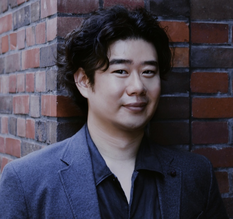
Han Kim
Bass
Han Kim
Birthplace:
Pohang, South Korea
Studies:
Bachelor, Seoul National University with Kwangchul Youn; Master Vocal performance, Hochschule für Musik Karlsruhe with Christian Elsner; Soloist’s Diploma Vocal performance, Hochschule für Musik Karlsruhe with Christian Elsner
Master class:
with Ann Murray, Hochschule für Musik Karlsruhe (2019), with David Selig, Hochschule für Musik Karlsruhe (2019)
Relation to the Hamburg State Opera:
Ensemble member of the Hamburg State Opera since the 2023/24 season
Was Member of the International Opera Studio of the Hamburg State Opera 2021/22 and 2022/23
Important parts:
Figaro (Le nozze di Figaro), Leporello/Masetto (Don Giovanni), Don Alfonso (Così fan tutte), Sprecher (Die Zauberflöte), Il conte Rodolfo (La sonambula), Don Basilio (Il barbiere di Siviglia), Don Fernando (Fidelio), Colline (La Bohème), Zuniga (Carmen)
Stages:
Theater Heidelberg
Cooperation with directors:
Sonja Trebes
Cooperation with conductors:
Dietger Holm
Performances
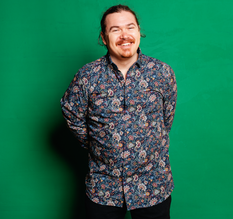
Daniel Kluge
Tenor
Daniel Kluge
Birthplace:
Buenos Aires, Argentina
Studies:
Hochschule für Musik Karlsruhe with Klaus Dieter Kern
Master classes:
with Roman Trekel, Julia Varady and Dietrich Fischer-Dieskau as well as master classes for „Liedgesang“ with Markus Hadulla, Mitsuko Shirai and Hartmut Höll
Relation to the Hamburg State Opera:
Ensemble member of the Hamburg State Opera since the 2019/20 season
Important parts:
Normanno (Lucia di Lammermoor), Abdallo (Nabucco), Remendado (Carmen), Flavio (Norma), Knappe und 1. Gralsritter (Parsifal), Kilian (Freischütz), Dr. Blind (Die Fledermaus), Spoletta (Tosca), Schreiber (Chowanschtschina), Jacquino (Fidelio), Ein Soldat (Reigen), Chick (Der Schaum der Tage), Borsa (Rigoletto), Knusperhexe (Hänsel und Gretel), Orpheus (Orpheus in der Unterwelt), Pedrillo (Die Entführung aus dem Serail), Truffaldino (Die Liebe zu drei Orangen), Balakin (Charodeyka), Max (Der Freischütz), Tanzmeister (Ariadne auf Naxos), Steuermann (Der fliegende Holländer), Vierter Jude (Salome), et al.
Stages:
Staatsoper Stuttgart, Staatsoper Wien, Volksoper Wien, Stadttheater Bern, Aalto-Theater Essen, Grand Théâtre de Genève, Nationaltheater Mannheim, Opéra National de Lyon, et al.
Cooperation with directors:
Jossi Wieler, Sergio Morabito, Kirill Serebrennikov, Nicola Hümpel , Tobias Hoheisel, Imogen Kogge, Armin Petras, Demis Volpi, Axel Ranisch, et al.
Cooperation with conductors:
Sylvain Cambreling, Georg Fritzsch, Roland Kluttig, Giacomo Sagripanti, Johannes Witt, Hans Christoph Bünger, Kirill Karabits, Willem Wentzel, Alejo Pérez, Christopher Schmitz, et al.
Performances
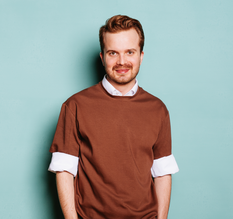
Hubert Kowalczyk
Bass
Hubert Kowalczyk
Birthplace:
Radom, Poland
Studies:
Hanns Eisler School of Music Berlin with Prof. Martin Bruns and Prof. Dr. Michail Lanskoi; Istituto Superiore di Studi Musicali "Pietro Mascagni" in Livorno with Prof. Graziano Polidori; Young Talents Development Program - Opera Academy in Warsaw
Master class:
Lioba Braun, Helmut Deutsch, Brigitte Fassbaender, Tomasz Konieczny, Bogdan Makal, Olga Pasiecznik, Eytan Pessen, Rudolf Piernay, Matthias Rexroth, Harald Stamm, et al.
Important parts:
Bartolo (Le nozze di Figaro), Collatinus (The Rape of Lucretia), Colline (La Bohème), Crespel (Les Contes d'Hoffmann), Haly (L'italiana in Algeri), Nourabad (Les Pêcheurs de perles), Oroveso (Norma), Pistola (Falstaff), Sarastro (Die Zauberflöte), Zuniga (Carmen), et al.
Relation to the Hamburg State Opera:
Ensemble member of the Hamburg State Opera since the 2021/22 season
Member of the International Opera Studio of the Hamburg State Opera from 2019/20 to 2021/22
Stages:
Staatsoper Unter den Linden, Zurich Opera House, Bregenz Festival, Deutsche Oper Berlin, Teatr Wielki - Opera Narodowa, Opera Rara Festival in Krakow, et al.
Cooperation with directors:
Calixto Bieito, David Bösch, Frank Castorf, Petra Deidda, Brigitte Fassbaender, Herbert Fritsch, Alexander Riemenschneider, Dmitri Tcherniakov, et al.
Cooperation with conductors:
Matteo Beltrami, Bertrand de Billy, Giampaolo Bisanti, Jonathan Brandani, Daniele Callegari, Paolo Carignani, Nicholas Carter, Vladimir Conta, Axel Kober, Volker Krafft, Carlo Montanaro, Pier Giorgio Morandi, Kent Nagano, Ivan Repušić, Sébastien Rouland, Robin Ticciati, Keri-Lynn Wilson, Lidiya Yankovskaya, et al.
Performances
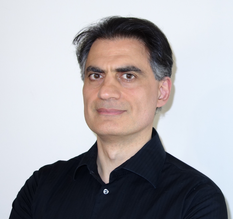
Tigran Martirossian
Bass
Tigran Martirossian
Birthplace:
Yerevan, Armenia
Studies:
Musical studies at the Gnessin State Academy of Music with Prof. Artur Eizen and Prof. Pavel Lisitsian
Prizes:
Prize winner of nine international singing competitions, inter alia, second prize in the “Neue Stimmen” Competition in Gütersloh (1997), second prize in the 2nd International Singing Competition in Shizuoka (2000), first prize in the Ondina Otta Competition in Marburg (1999)
Relation to the Hamburg State Opera:
Ensemble member of the Hamburg State Opera since 2005/06
Important parts:
Ramfis (Aida), König René (Jolanthe), Salieri (Mozart und Salieri), Fiesco (Simon Boccanegra), Dulcamara (L’Elisir d’Amore), Figaro (Le Nozze di Figaro), Sulpice (La Fille du Régiment), Colline (La Bohème), Basilio (Il Barbiere di Siviglia), Selim (Il Turco in Italia), Banco (Macbeth), Pagano (I Lombardi alla prima Crociata), Daland (Der fliegende Holländer), Dossifei (Chowanschtschina), Fasolt (Das Rheingold), Rodolfo (La Sonnambula), Raimondo (Lucia di Lammermoor) Don Magnifico (La Cenerentola), Philippe II (Don Carlos), Méphistophélès (Faust), Fürst Galizky (Fürst Igor), Ein Eremit (Der Freischütz), Doktor (Wozzeck), Oroveso (Norma) , Pimen (Boris Godunov), et al.
Stages:
Novaya Opera Theatre of Moscow, Bolshoi Theatre, Metropolitan Opera, Teatro alla Scala, Opéra National de Paris, Teatro Real in Madrid, Bayerische Staatsoper, Wiener Staatsoper, Maggio Musicale Fiorentino, Salzburg Festival, Theater an der Wien, Bregenz Festival, Staatsoper Unter den Linden Berlin, Royal Opera House Covent Garden, Opéra Bastille, St. Galler Festspiele, et al.
Cooperation with directors:
Achim Freyer, Yona Kim, Jochen Biganzoli, David Alden, Andreas Homoki, Vincent Boussard, Stefan Herheim, Florentine Klepper, Francesca Zambella, et al.
Cooperation with conductors:
Sir Colin Davis, Zubin Mehta, James Levine, Mstislav Rostropovich, Carlo Rizzi, Simone Young, Plácido Domingo, Kent Nagano, Sylvain Cambreling, Valery Gergiev, Michel Plasson, Jukka-Pekka Saraste, Michael Tilson-Thomas, Daniel Oren, Mark Wigglesworth, Philippe Jordan, Daniele Callegari, Riccardo Frizza, et al.
Performances

Dovlet Nurgeldiyev
Tenor
Dovlet Nurgeldiyev
Birthplace:
Ashgabat, Turkmenistan
Studies:
Vocal studies at the Music College in Ashgabat, at the Turkmen National Conservatory, at the Conservatory Tilburg and at Koninklijk Conservatorium Den Haag
Relation to the Hamburg State Opera:
Member of the International Opera Studio (2008/9-2009/10)
Ensemble member since 2010/11
Important parts:
Dmitriy (Boris Godunov), Stewa (Jenufa), Tito (La Clemenza di Tito), Erik (Der fliegende Holländer), Fenton (Falstaff), Nemorino (L’Elisir d’Amore), Alfredo (La Traviata), Ferrando (Così fan tutte), Belmonte (Die Entführung aus dem Serail), Tamino (Die Zauberflöte), Don Ottavio (Don Giovanni), Lensky (Eugene Onegin), Vladimir (Prince Igor), Telemaco (Il Ritorno d'Ulisse in Patria), Alfred (Die Fledermaus), Chevalier (Dialogues des Carmelites), Hylas (Les Troyens), Macduff (Macbeth), Ismaele (Nabucco), Cassio (Otello), Naraboth (Salome), Medoro (Orlando Paladino), Belfiore (La finta giardiniera), et al.
Stages:
Hamburgische Staatsoper, Bayerische Staatsoper, Münchner Opernfestspiele, Staatsoper Unter den Linden Berlin, Deutsche Oper Berlin, Oper Frankfurt, Ungarische Staatsoper, Polnische Staatsoper, Opéra National de Montpellier, Opéra de Rouen Normandie, Auditorium de Bordeaux, Elbphilharmonie Hamburg, Gewandhaus Leipzig, Laeizhalle Hamburg, Prinzregententheater München, Santa Fe Opera(US), Gran Teatre del Liceu, Concertgebow Amsterdam, Palau del la Musica, Auditoriu Barcelona, Auditoriu Madrid,et al.
Cooperation with directors:
Hans Neuenfels, Marie-Eve Signeyrole, Renaud Doucet, Vincent Boussard, Jette Steckel, Willy Decker, Axel Ranisch, et al.
Cooperation with conductors:
Ivor Bolton, Kent Nagano, Bertrand de Billy, Keri Lynn Wilson, Philippe Auguin, Lothar Zagrosek, Michael Schonwandt, Stefan Soltesz, Henrik Nánási, Stefano Ranzani, Andrea Battistoni, Simone Young, et al.
Performances
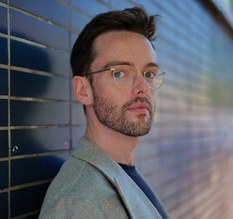
Nicholas Mogg
Baritone
Nicholas Mogg
Birthplace:
Manchester, United Kingdom
Studies:
International Opera Studio, Hamburg State Opera; National Opera Studio, London; Royal Academy of Music, London; Clare College, University Cambridge
Masterclass:
with Sir Simon Keenlyside, Christian Gerhaher, Malcolm Martineau, Brigitte Fassbaender, Gerald Finley, Sir Thomas Allen
Relation to the Hamburg State Opera:
Ensemble member of the Hamburg State Opera since the 2022/23 season
Was Member of the International Opera Studio of the Hamburg State Opera from 2019/20 to 2022/23
Prizes:
Royal Over-Seas League Singers’ Section; Richard Lewis/Jean Shanks Award
Roles:
Don Giovanni (Don Giovanni), Guglielmo (Così fan tutte), Ned Keene (Peter Grimes), Aeneas (Dido and Aeneas), Dandini (La Cenerentola), Steward (Flight), Herr Peachum (Die Dreigroschenoper), Melisso (Alcina), Jupiter (Orphée aux Enfers), et al.
Stages:
Hamburg State Opera, Glyndebourne Festival Opera, Wigmore Hall, Philharmonie de Paris, Het Concertgebouw, Festival Aix, Elbphilharmonie, Theater Lübeck
Cooperation with directors:
Keith Warner, Herbert Fritsch, Tim Albery, Orpha Phelan, Richard Jones
Cooperation with conductors:
Robin Ticciati, Sir John Eliot Gardiner, Ton Koopman, Sir Roger Norrington, Yoel Gamzou, Francesco Ivan Ciampa, Alan Gilbert, Kent Nagano
Performances
- Carmen
- Boris Godunov
- Jubiläumsgala: 30 Jahre Internationales Opernstudio
- La Bohème
- Die Zauberflöte (The Magic Flute)
- 2nd chamber concert
- Manon
- „Muss denn in diesem Land immer alles politisch sein?“
- Les Contes d'Hoffmann
- Don Pasquale
- Don Pasquale (concerted)
- La Fanciulla del West (The Girl of the West)
- Salome
- Così fan tutte
- Ariadne auf Naxos
- L'elisir d'amore
- La Traviata
- Tristan und Isolde (Tristan and Isolde)
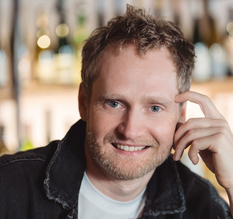
Oleksiy Palchykov
Tenor
Oleksiy Palchykov
Birthplace:
Kiev, Ukraine
Studies:
At the Vocal Faculty of the Petro Tchaikovsky National Music Academy of Ukraine, Atelier Lyrique of the Opéra National de Paris
Prizes:
Grand Prix of the XVI International Lydia Abramova Vocal Student’s Competition “Bella voce” in Moscow, special prize of the Jury at the International Vocal Competition “Debut” in Wiekersheim, Prix Lyrique du Carpeaux, Prix Lyrique de L'AROP, finalist of the BBC Cardiff Singer of the World Competition.
Relation to the Hamburg State Opera:
Ensemble member of the Hamburg State Opera since 2017/18
Important parts:
Lensky (Eugene Onegin), Alfredo (La Traviata), Fenton (Falstaff), Edgardo (Lucia di Lammermoor), Nemorino (L’Elisir d’Amore), Il Conte d’Almaviva (Il Barbiere di Siviglia), Ottavio (Don Giovanni), Ferrando (Così fan tutte), Tamino (Die Zauberflöte), Belmonte (Die Entführung aus dem Serail), Pylade (Iphigénie en Tauride), Paris (La belle Hélène), Lysander (A Midsummer Night’s Dream), Male Chorus (The Rape of Lucretia), Cassio (Otello), Narraboth (Salome), Beppe (Pagliacci), Sinowi (Lady Macbeth of Mtsensk), Lykow (The Tsar’s Bride), Gritsko (Sorochintsi Fair), Kudryash (Katia Kabanova), Alfred (Die Fledermaus), et al.
Stages:
The Lyon Opera house, Opera Bastille, Opera Garnier, Athénée-Théâtre, Opernhaus Zürich, Festival d’Aix-en-Provence, Edinburg International Festival, Garsington Festival, Bayerische Staatsoper, Komische Oper Berlin, Staatsoper Hamburg, Champs Elysees Theatre, National Opera of Monpellier, National Opera of Ukraine, M. Dzhalil Tatar Academic State Opera, Chaliapin Festival, Le Théâtre du Léman, Palazzo dei Congressi Lugano, et al.
Cooperation with directors:
Andreas Homoki, Krzysztof Warlikowski, Barrie Kosky, Calixto Bieito, Willy Decker,
Renaud Doucet/André Barbe, Mariame Clement, William Kentridge, Christophe Perton, Àlex Ollé, Laurent Pelly, Olivier Py, et al.
Cooperation with conductors:
Nello Santi, Philippe Jordan, Kent Nagano, Visiliy Petrenko, Michael Schønwandt, Riccardo Frizza, Kazushi Ono, Paolo Carignani, Alessandro De Marchi, Daniele Callegari, Henrik Nánási, Vakclav Luks, et al.
Performances
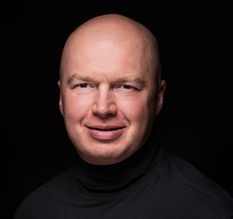
Alexander Roslavets
Bass
Alexander Roslavets
Birthplace:
Brest, Belarus
Studies:
Rimsky-Korsakov Staatskonservatorium in St. Petersburg bei Professor Nikolai Okhotnikov (2009-2014), Young Artist Programme Bolschoi-Theater in Moskau (2014-2016)
Master classes:
With Elena Obraztsova, Edda Moser, Dmitry Vdovin, Evgeny Nesterenko, Irina Bogacheva, Lubov Orfenova, Neil Shicoff, Bernd Weikl, Carol Vaness, John Fisher
Prizes:
Third prize in the first International Music Competition in Harbin (2018), third and special prize in the Queen Sonja International Music Competition (2017), second prize in the second International Opera Singing Competition of Portofino (2017), special prize in the 36th International Hans Gabor Belvedere Singing Competition (2017), grand prix and audience prize in the second International Eva Marton singing competition in Budapest (2016), second prize in the sixth Galina Vishnevskaya International Opera Singers Competition (2016), grand prix in the Special Foundation Of The President Of Belarus Supporting Talented Youth (2016), first prize in the seventh International Competition of Opera Singers in Saint-Petersburg (2015), diploma in the 10th Elena Obraztsova International Competition Of Young Opera Singers (2015), special prize in the first International Christmas Vocal Competition in Minsk (2014), grand prix in the 42nd Russian National Vocal Graduates Competition in St. Petersburg (2014)
Relation to the Hamburg State Opera:
Ensemble member of the Hamburg State Opera since 2016/17
Important parts:
Malyuta Skuratov (Die Zarenbraut), Mephistopheles (Faust), König Dodon (Der goldene Hahn), Colline (La Bohème), Bartolo (Le Nozze de Figaro), Commenadatore, Masetto (Don Giovanni), Brander (La Damnation de Faust), Il Conte di Monterone (Rigoletto), 5.Jude (Salome), Lodovico (Otello), Il Sagrestano und Cesare Angelotti (Tosca), Raimondo Bidebent (Lucia di Lammermoor), Peter Quince (A Midsummer Night’s Dream), Lo zio Bonzo (Madama Butterfly), Don Basilio (Il Barbiere di Siviglia), Fafner (Das Rheingold), Fafner (Siegfried), Sarastro (Die Zauberflöte), King René (Iolanta), Banco (Macbeth), Prince Gremin (Eugen Onegin), Daland (Der Fliegende Holländer), Vodnik (Rusalka), Dulcamara (L’Elisir d’Amore), Ali Baba (Ali Baba), et al.
Stages:
Mikhailovsky Theater, Bolschoi Theater, Tschaikowsky-Konzertsaal in Moskau, Bolschoi Theater in Weißrussland, St. Petersburger Philharmonie benannt nach Schostakowitsch, Ungarische Staatsoper, Hamburgische Staatsoper, Teatro alla Scala, Metropolitan Opera, Glyndebourne Festival, Berliner Philharmoniker, et al.
Cooperation with directors:
Rimas Tuminas, Calixto Bieito, Tito Capobianco, Paul Curran, Stanislav Gaudasinsky, Peter Stein, Alexey Stepaniuk, Achim Freyer, Liliana Cavani, Mariusz Trelinski, Melly Still, Jan Bosse, et al.
Cooperation with conductors:
Adam Fischer, Robin Ticciati, Henrik Nanasi, Vladimir Jurowski, Ainars Rubikis, Daniele Rustioni, Tugan Sokhiev, Fabio Mastrangelo, Anton Grishanin, Michal Klauza, Gregor Bühl, Kent Nagano, Paolo Carignani, Renato Palumbo, Pier Giorgio Morandi, Yves Abel, Stefano Ranzani, Carlo Rizzari, Christof Prick, Nathan Brock, Sergei Stadler, Yuri Simonov, Michail Jurowski, Vladimir Fedoseyev, Alexander Anisimov, et al.
Performances
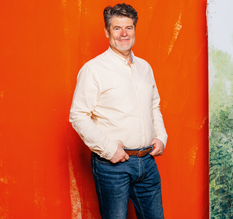
Jürgen Sacher
Tenor
Jürgen Sacher
Birthplace:
Augsburg, Germany
Studies:
Church music and music education at the Leopold-Mozart Konservatorium in Augsburg, vocal studies with Leonore Kirschstein
Prizes:
Scholarship of the Richard Wagner Verband, Promotion Prize of the Hamburgische Staatsoper, appointment as Hamburger Kammersänger (2017)
Relation to the Hamburg State Opera:
Ensemble member of the Staatsoper Hamburg since 1991/92
Important parts:
Mime (Siegfried), Mime/Loge (Das Rheingold), Herodes (Salome), Knusperhexe (Hänsel und Gretel), Hauptmann/Andres (Wozzeck), Monostatos/1. Geharnischter (Die Zauberflöte), Maler/Prinz/Marquis/Kammerdiener (Lulu), Dr. Cajus (Falstaff), Tichon (Katja Kabanova), Truffaldino (Die Liebe zu den drei Orangen), Valzacchi (Der Rosenkavalier), David (Die Meistersinger von Nürnberg), Junger Mann (Moses und Aron), Steuermann (Der fliegende Holländer), Peter Iwanow (Zar und Zimmermann), Pedrillo (Die Entführung aus dem Serail), Walther von der Vogelweide (Tannhäuser), Goro (Madame Butterfly), Graf Elemer (Arabella), Raoul de St. Brioche (Die lustige Witwe), Novagerio (Palestrina), Orontes (Flavius Bertaridus), Asasello (Der Meister und Margarita), Tanzmeister (Ariadne auf Naxos), Graf von Kent (Lear), Reverend Adams (Peter Grimes), L´Aumonier (Dialogues des Carmélites), Aegisth (Elektra), Fedotik (Tri Sestri), Sylvester von Schaumburg (Mathis der Maler), et al.
Stages:
Hamburgische Staatsoper, Staatsoper Unter den Linden, La Monnaie, Gran Teatre del Liceu, Königliche Oper von Kopenhagen, Teatro alla Scala, Salzburger Festspiele, Theater an der Wien, Budapester Staatsoper, Theatro Municipal de São Paulo, Wagner Festival Budapest, Theater Dortmund, Staatstheater Braunschweig, Staatsoper Budapest, et al.
Cooperation with directors:
Harry Kupfer, Willy Decker, Claus Guth, Mario Martone, Achim Freyer, Géza M. Tóth, Livia Sabag, Roger Vontobel, Stefan Herheim, Karoline Gruber, Vincent Boussard, Jochen Biganzoli, et al.
Cooperation with conductors:
Adam Fischer, Bertrand de Billy, Claudio Abbado, Kent Nagano, Semyon Bychkov, Horst Stein, Christian Thielemann, Ingo Metzmacher, Michael Boder, Kirill Petrenko, Simone Young, Daniel Barenboim, et al.
Performances
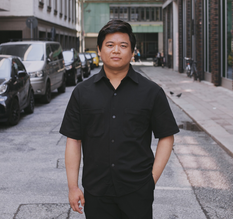
Seungwoo Simon Yang
Tenor
Seungwoo Simon Yang
Birthplace:
Gwangyang, South Korea
Studies:
Singing at Hochschule für Musik und Theater Hamburg with Prof. Carolyn Grace James
Master class:
Bo Skovhus, Eytan Pessen, Lioba Braun, Brigitte Eisenfeld, Gregory Kunde, Chris Merritt, Piotr Beczala, Dorothea Röschmann, Kwangchul Youn, Olga Peretyatko, Ralph Strehle, Harald Stamm, et al.
Prizes:
1st Prize Elise Meyer Competition (2020), 1st Prize of the Mozart Singing Competition (2020), Special Prize and 2nd Prize of the Maritim Music Award (2019), 2nd Prize of the Maritim Music Award (2018), 1st Prize of the Korean Singing Competition (2015), 1st Prize of the Korea Talent Award (2015), 1st Prize of the Ehwa & Kyunghyang Competition (2014), 1st Prize Shin Young-Ok Voice Competition (2014), 1st Prize of the Shinhan Music Award (2014)
Relation to the Hamburg State Opera:
Ensemble member of the Hamburg State Opera since the 2023/24 season
Was Member of the International Opera Studio of the Hamburg State Opera from 2020/21 to 2023/24
Important parts:
Lord Arturo Bucklaw (Lucia di Lammermoor), Pong (Turandot), Alfred (Die Fledermaus), Beppe (Pagliacci), Jaquino (Fidelio), Tamino (Die Zauberflöte), Ferrando (Così fan tutte), Pilade (Oreste), Nemorino (L'Elisir d'amore), Rodolfo (La Bohème), et al.
Stages:
Hamburg State Opera, Zurich Opera, Salzburg Festival
Cooperation with directors:
Guy Montavon, Yona Kim, Sascha Alexander Todtner, Amélie Niermeyer
Cooperation with conductors:
Kent Nagano, Stefano Ranzani, Roberto Rizzi-Brignoli, Francesco Ivan Ciampa, Daniele Callegari, Giampaolo Bisanti, Leonardo Sini, Matteo Beltrarmi, Paolo Arrivabini, Giacomo Sagripanti, et al.
Performances
Guest Singers 2023|24
Rosie Aldridge
Janina Baechle
J'Nai Bridges
Angela Brower
Layla Claire
Tara Erraught
Sofia Fomina
Catherine Foster
Katrina Galka
Aida Garifullina
Adriana González
Asmik Grigorian
Ekaterina Gubanova
Elena Guseva
Evelyn Herlitzius
Jennifer Holloway
Eve-Maud Hubeaux
Julia Lezhneva
Michèle Losier
Raffaella Lupinacci
Nino Machaidze
Ruzan Mantashyan
Elena Maximova
Olga Peretyatko
Ailyn Pérez
Ewa Płonka
Emily Pogorelc
Anna Princeva
Anna Prohaska
Masabane Cecilia
Rangwanasha
Natalya Romaniw
Ks. Gabriele
Rossmanith
Gabriela Scherer
Simone Schneider
Madeleine Shaw
Na'ama Shulman
Siobhan Stagg
Jacqueline Stucker
Marta Świderska
Tuuli Takala
Vera Talerko
Natalia Tanasii
Violeta Urmana
Eva-Maria
Westbroek
Verity Wingate
Sonya Yoncheva
Guanqun Yu
Selene Zanetti
Marcelo Álvares
Jake Arditti
Julian Arsenault
Thomas Atkins
Krzysztof Bączyk
Clive Bayley
Jean-François
Borras
Pavel Černoch
Michael Colvin
John Daszak
Andrew Dickinson
Ks. Andrzej Dobber
Adam Filończyk
Lukasz Golinski
Vittorio Grigolo
Clay Hilley
Ioan Hotea
Soloman Howard
Gwyn Hughes Jones
Karl Huml
Jacques Imbrailo
Zachariah N. Kariithi
Peter Kellner
Kyle Ketelsen
Kangmin Justin Kim
Young Woo Kim
Matthias Klink
Vitalij Kowaljow
James Kryshak
Johannes Martin
Kränzle
Gregory Kunde
Stefano La Colla
Liang Li
Long Long
Filipe Manu
Ayk Martirossian
Lucas Meachem
Leigh Melrose
Martin Mitterrutzner
Huw Montague
Rendall
Jakub Józef Orliński
Ian Paterson
Pene Pati
Michele Pertusi
George Petean
Simone Piazzola
Christoph Pohl
Matthew Polenzani
Rodrigo Porras
Garulo
Cody Quattlebaum
Bernard Richter
Sergey Romanovsky
Anton Rositskiy
Daniel Schmutzhard
Erwin Schrott
Franz-Josef Selig
Adam Smith
Kostas Smoriginas
Yngve Søberg
Efraín Solís
Ryan Speedo Green
Michael Spyres
Mark Stone
Roberto Tagliavini
Russell Thomas
Alexander
Tsymbalyuk
Franco Vassallo
Alexander
Vinogradov
Ks. Klaus Florian
Vogt
Michael Volle
Robert Watson
Vincent Wolfsteiner
Guest Conductors 2023|24
Paolo Arrivabeni
Matteo Beltrami
Giampaolo Bisanti
Daniele Callegari
Paolo Carignani
Stephanie Childress
Jonathan Darlington
Finnegan Downie
Dear
Adam Fischer
Yoel Gamzou
Luiz de Godoy
Johannes Harneit
Leo Hussain
Alexander Joel
Dirk Kaftan
Axel Kober
Volker Krafft
Francesco Lanzillotta
Louis Lohraseb
Ariane Matiakh
Tomáš Netopil
Lorenzo Passerini
Evelino Pidò
Leonardo Sini
Giedrė Šlekytė
Honorary Members of the Hamburg State Opera
Ks. Plácido Domingo
Ks. Franz Grundheber
Marianne Kruuse
Detlef Meierjohann
Prof. John Neumeier
Prof. Dr. Peter Ruzicka
Wolf-Jürgen Wünsche †
Simone Young

